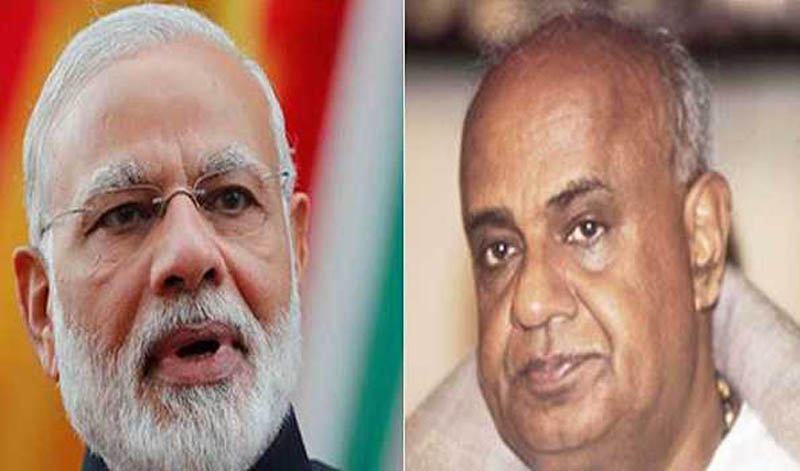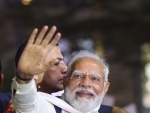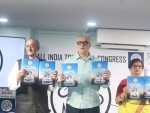 Deve Gowda
Deve Gowda Former Indian PM Deve Gowda welcomes rollback of farm laws, suggests permanent commission for farmers
Bengaluru/UNI: Welcoming Prime Minister Narendra Modi's decision to repeal three farm laws on Friday, former Prime Minister HD Deve Gowda saluted the farmers for putting up a democratic resistance against the laws and added that debate and discussion is key in a Parliamentary setup.
Attaching a copy of his speech that he made against the farm laws in Rajya Sabha in September 2020, Gowda on Friday tweeted that the farm laws had sown the seeds of doubt in the farming community and the government should have engaged primary stakeholders and communicated its implications in a language they understand.
The speech laid emphasis on formation of a permanent commission for the farming sector, which would continuously look at, and work on their grievances.
The commission should produce a bi-annual socio-economic audit of the farm sector for the Parliament to discuss, he had said.
Gowda had suggested that the government should consider replacing the Commission on Agricultural Costs and Prices (CACP) by an agriculture tribunal, which again strengthened the doubt of farmers that the MSP regime may end sooner than later.
A tribunal for farmers may be necessary, but that should not be at the cost of replacing the body that determines MSP, he had stated.
Interestingly, the government has proposed a tribunal because it is aware that the reforms they are trying to bring about in the agriculture sector will throw farmers into a whirlpool of disputes, he added.
Gowda had said the small and marginal farmers may not have been in a position to deal with complex contracts that they may have to enter into with private players, and big corporations.
"They may both need help to enter into these contracts as well as sort out disputes arising out of the contracts. We should understand that our farmers are neither lawyers nor MBAs," he had said.
The existing APMC system allows the farming community the power of collective and community bargaining, Gowda said, adding that the proposed farm laws would take that power away.
Gowda had felt the farm bills would increase middlemen because farmers will need intermediaries of a different kind to read the fine print of documents that private players and corporations may put forward.
Since farming in the country is not purely an economic activity or a business enterprise, a permanent commission will be able to address the various social and economic dimensions of the farming sector, he had said. Farming should be viewed as social entrepreneurship, he added.
Gowda had said one of the Central fears of the farmers is that the ordinances may be a ploy, and a precursor, to phase out grain procurement at minimum support prices (MSP).
"This they perceive would throw them to the mercy of private players and big corporations," he added.
Given the history of reforms in the country, which has hardly been farmer-centric, Gowda had said the suspicions of the farming community may not be misplaced.
"In 1991, when Sri PV Narasimha Rao's government with Sri Manmohan Singh as Finance Minister announced a phased withdrawal of fertiliser subsidy, as part of economic reforms, I had to take the unprecedented step of registering my protest in the well of the House for the first, and only time, in my political career. Therefore, the word `reforms' has generally not gone down well with the farming community because it has never been explained to them, and has always been brought in by stealth," he had stated.
This time too, since the ordinances were introduced hurriedly during a raging pandemic, there appears to be widespread doubt, Gowda had said, adding it is therefore imperative that the Prime Minister comes forward to spell out the government's true intent unambiguously.
"Why the hurry and why during the pandemic? He should explain what the three Bills will do to the farm community in the short and long term, and how it would achieve the government's stated goal of doubling farmers' income by 2022," he had said.
According to the government's own record, Gowda had said the agriculture growth rate has stagnated at 2.8 per cent in the last six years and in this light, it is important to remind that the agriculture workforce in India is more than 50 per cent, and its contribution to GDP is no less than 18 per cent.
In the post-pandemic situation, the workforce figures may even shoot up, given the depletion of employment opportunities in urban centres, he had said.
Support Our Journalism
We cannot do without you.. your contribution supports unbiased journalism
IBNS is not driven by any ism- not wokeism, not racism, not skewed secularism, not hyper right-wing or left liberal ideals, nor by any hardline religious beliefs or hyper nationalism. We want to serve you good old objective news, as they are. We do not judge or preach. We let people decide for themselves. We only try to present factual and well-sourced news.







